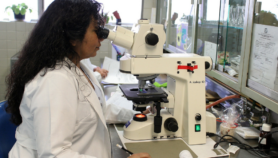Send to a friend
The details you provide on this page will not be used to send unsolicited email, and will not be sold to a 3rd party. See privacy policy.
[ABUJA] Nigeria has not fulfilled the promise made two years ago to use at least one per cent of the country’s gross domestic product (GDP) to fund and promote science.
According to the New York-based Revenue Watch Institute’s report issued last May, “Nigeria is Africa's largest oil exporter, and the world's 10th largest oil producer, accounting for more than 2.2 million barrels a day in 2011. Oil revenues totalled US$50.3 billion in 2011 and generated 70 per cent of government revenues”.
Nigeria's recent science, technology and innovation policy, approved in December 2011 by the country’s highest decision-making body, the Federal Executive Council, advocated that a minimum of one per cent of the country's GDP be used to fund a National Science, Technology and Innovation Fund.
“We need to fund science and technology with money from oil. There are many countries that do not have oil, and they are much richer than Nigeria because they have invested in science for their development.”
Oyewale Tomori, Nigerian Academy of Science
The fund is to be administered by an independent board headed by Nigeria's President Goodluck Jonathan who is a scientist. It was planned to create and sustain reliable mechanisms for adequate funding of science, technology and innovation activities in Nigeria
But the fund, like a 2006 proposal to use oil revenue for science, seems dead and is now a source of worry among scientists.
Turner Isoun, who was the minister of science and technology in 2006, tells SciDev.Net: “I advocated for a National Science and Technology Endowment Fund. I took memos to the National Executive Council three times and failed. I wanted part of the excess crude account [a separate fund for saving surplus profits from oil] to fund research and development but they refused”.
The Tertiary Education Trust Fund established in 2011, he adds, “is supposed to fund research and development but it is not serving the purpose for which it was created”.
The president of the Nigerian Academy of Science Oyewale Tomori describes the Nigerian government as one that does not keep promises.
He tells SciDev.Net: “We need to fund science and technology with money from oil. There are many countries that do not have oil, and they are much richer than Nigeria because they have invested in science for their development”.
But Onyebuchi Chukwu, Nigeria’s minister of health tells SciDev.Net that the government has directed relevant agencies to work out the modalities for a fund, which is not necessarily from oil revenue.
Chukwu says that the Federal Ministry of Science and Technology is leading the establishment of the new science fund.
“We need to fund researches but because of budgetary constraints we cannot readily fund them the way they should be funded. If you go to the Nigerian Institute of Medical Research, for instance, a lot is also going on there, but again it is how to link their findings to the industry,” Chukwu notes.
Chux Daniels, a researcher at the Science and Technology Policy Research, University of Sussex, United Kingdom, says that he doubts the sincerity of Nigerian government in announcing the new fund without a well-thought-out funding structure.
This article has been produced by SciDev.Net's Sub-Saharan Africa desk.














